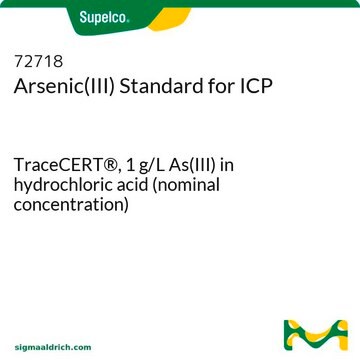311383
Arsenic(III) oxide
ACS reagent (primary standard)
Sinónimos:
Arsenic trioxide, Arsenous acid
About This Item
Productos recomendados
grade
ACS reagent (primary standard)
Quality Level
vapor pressure
0 hPa ( 66 °C)
assay
99.95-100.05%
form
powder
reaction suitability
reagent type: catalyst
core: arsenic
ign. residue
≤0.02%
solubility
dilute HCl: insoluble ≤0.01%
anion traces
S2-: passes test (lim. ~0.001%)
chloride (Cl-): ≤0.005%
cation traces
Fe: ≤5 ppm
Pb: ≤0.002%
Sb: ≤0.05%
SMILES string
O=[As]O[As]=O
InChI
1S/As2O3/c3-1-5-2-4
InChI key
IKWTVSLWAPBBKU-UHFFFAOYSA-N
¿Está buscando productos similares? Visita Guía de comparación de productos
Categorías relacionadas
General description
Application
- In the synthesis of arsenic pentafluoride (AsF5) by static fluorination method in a closed system.
- In the preparation of arsenic-doped ZnO films by adding As2O3 to zinc acetate, 2-methoxyethanol, and monoethanolamine by sol-gel spin coating method.
signalword
Danger
hcodes
Hazard Classifications
Acute Tox. 2 Oral - Aquatic Acute 1 - Aquatic Chronic 1 - Carc. 1A - Eye Dam. 1 - Skin Corr. 1B - STOT RE 1
target_organs
Respiratory system,Cardio-vascular system,Gastrointestinal tract
Storage Class
6.1A - Combustible acute toxic Cat. 1 and 2 / very toxic hazardous materials
wgk_germany
WGK 3
flash_point_f
Not applicable
flash_point_c
Not applicable
Certificados de análisis (COA)
Busque Certificados de análisis (COA) introduciendo el número de lote del producto. Los números de lote se encuentran en la etiqueta del producto después de las palabras «Lot» o «Batch»
¿Ya tiene este producto?
Encuentre la documentación para los productos que ha comprado recientemente en la Biblioteca de documentos.
Los clientes también vieron
Nuestro equipo de científicos tiene experiencia en todas las áreas de investigación: Ciencias de la vida, Ciencia de los materiales, Síntesis química, Cromatografía, Analítica y muchas otras.
Póngase en contacto con el Servicio técnico











